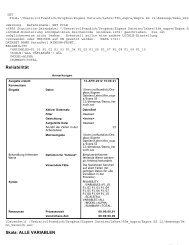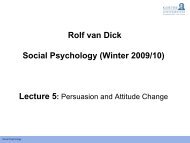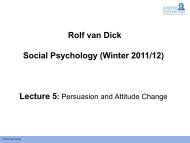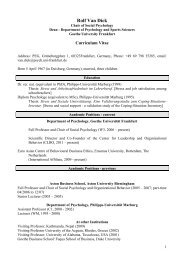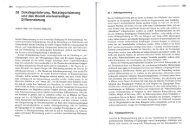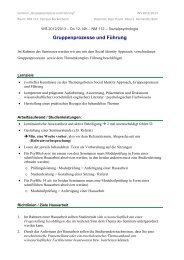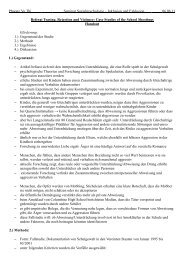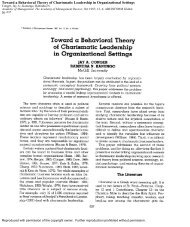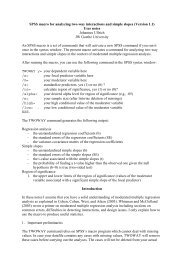Leadership-Interview-Transkript - Sozialpsychologie - Goethe ...
Leadership-Interview-Transkript - Sozialpsychologie - Goethe ...
Leadership-Interview-Transkript - Sozialpsychologie - Goethe ...
Sie wollen auch ein ePaper? Erhöhen Sie die Reichweite Ihrer Titel.
YUMPU macht aus Druck-PDFs automatisch weboptimierte ePaper, die Google liebt.
Rolf van Dick: So leaders need to be self-reflective and need to transport this to the team or<br />
the organization they lead, particularly in times of success.<br />
Frederick Morgeson: Yes, well it’s a sort of constant intervention, this idea of whatever<br />
gives you your advantage needs to be continuously renewed. If you have success, sure you’re<br />
on the top, and then there’s only one way to go, and that’s merely down. So, you always have<br />
to be willing to give up the things that made you successful, to be successful in the future!<br />
There are so many examples of leaders and organizations that haven’t done this, and they<br />
suffered.<br />
Rolf van Dick: In your own leadership positions, I mean you’re supervising PhD-students,<br />
you’re leading the team of editors, you’ve done consultancy projects and I guess some of<br />
them with a group of people. What would you consider most important, what have you done<br />
that you’re proud of and where you would say, there I showed leadership or do show<br />
leadership and that’s important?<br />
Frederick Morgeson: Things that I’m most happy about are when I’m able to figure out<br />
what motivates individual people and what their aspirations are and then act in a way and help<br />
them to achieve whatever it is that they’re seeking to achieve. So whatever their individual<br />
goals are. I think the other thing that gratifies me is this idea of having sort of sense of where<br />
we wanna go, having an idea of what to pursue, a vision of things. And then to into it and<br />
pursue it. We often valuate leaders who espouse visions but there’s also a certain value in not<br />
only having the vision but then seeing it through. And so, both pieces are turn out to be<br />
important. For example, with the journal, I have a distinctive idea of how to promote the<br />
journal and how to try to move it forward and kind of leverage the strengths that exist.<br />
Coming up with that and beginning to promote that and articulate that, is exciting.<br />
Rolf van Dick: Do you find that relatively easy or do you think that because it’s so important,<br />
it’s also the most challenging?<br />
Frederick Morgeson: Well, so you have to continually have a message. You have to have a<br />
set of points that are sort of memorable and convincing, and you have to continually remind<br />
people of this. Saying it once isn’t enough. One of the things I’ve done with the journal is<br />
trying to understand what is the purpose and the mission of the journal and how does that<br />
make it somehow distinct from other journals. So the tagline I came up with is this idea of the<br />
“study of people at work”. So, if you are researching people in organizations, we are<br />
interested in that research as a journal. That’s in short the mission of the journal.<br />
Rolf van Dick: Do you think for your own personal leadership style or in your general<br />
interactions with people it helps to know the theory and the research evidence, do you think<br />
that’s an advantage?<br />
Frederick Morgeson: Yes, I think it’s a good advantage. If you have knowledge of the facts,<br />
it’s really helpful. I think the one thing that we know about leadership, is that there’s no one<br />
best way to lead. I view kind of leadership theories as sort of the set of possible things you<br />
can do or be or create in your organization. The task of a leader in terms of developing<br />
yourself is to try to understand who they are. Understand where ever their unique strengths lie<br />
and how to leverage these unique strengths. In terms of leadership, a way to understand those<br />
strengths and understand the possibilities is to actually understand something about leadership<br />
research and theories.




